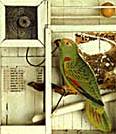Law and War: An American Story, by Peter Maguire.
New York: Columbia University Press, 2000. xii + 290 pp. Notes, bibliography, index. $30.00 (cloth), ISBN 0-231-12050-8.
Review by Jonathan Lurie, Rutgers University, Newark.
Published by H-Law (July, 2001)
/www.h-net.org/reviews/showrev.cgi?path=26823997212359
The Trials of War
Law and War is a fascinating, occasionally flawed and frustrating, but ultimately successful work that is well worth reading. Moreover, as we await and anticipate the impending war crimes trial of Slobodan Milosevic, Peter Maguire's work is especially timely. Although much of the book focuses on the Nuremberg trials, Maguire, who has taught on this subject at Columbia University and Bard College and was historical advisor to the documentary "Nuremberg: A Courtroom Drama," quite properly places this topic in a broader context ... (
link to more)
The resulting account of "law and war" focuses on four preludes to Nuremberg: our [American] Civil War; the virtual destruction, if not elimination, of Native American society; the Philippine insurrection; and World War I. Maguire contends, I believe correctly, that unless one understands how American policy towards law and war was shaped and reshaped by these four developments, it is impossible to grasp the ultimate significance of the Nuremberg trials AND their implications concerning future American policy, for better or for worse. Those who feel confident about U.S. policy as we head into the latest round of international war crimes trials, aptly described by Yale Law Professor Ruth Wedgwood as "a growth industry," ought to read Maguire's book and carefully ponder his conclusions.[1] Maguire argues that the lessons of Nuremberg "remain unclear" in part because "what that name represents is really a series of contradictory trials that lead to no single, simple conclusion" (p. 5). They represent a telling example of "the storm where war, law and politics swirl and oscillate in a constant state of flux." As with much of our history, the Nuremberg Trials reflected a real "tension between America's much-vaunted ethical and legal principles and its practical policy interests" (pp. 5-6). Moreover, American history demonstrates an inability and/or disinclination to make war with a common set of expectations and procedures.
Thus we fought the Civil War, the Indian Wars, and the Philippine insurrection with very different tactics and perceptions of our opponents. Denouncing some opponents as "savages" or "barbarians," we made war according to different sets of rules, depending on who our adversaries were. Treaties ending hostilities with England were one thing, but solemn promises made to Indians were quite another. Opponents in Cuba were not equated with Phillipino natives clothing their insurrection in the rhetoric of a quest for independence.





